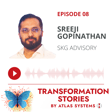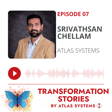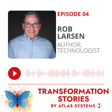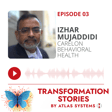Become a Creator today!Start creating today - Share your story with the world!
Start for free
00:00:00
00:00:01

#5: Ramakant Verma
While AI seems to be the topic of every business discussion today, real-world understanding of its potential and how it can be applied for problem solving are often lacking. Join Atlas Systems expert and team leader Ramakant Verma to explore AI from every angle – and learn how it might benefit you!
Recommended
Transcript
Podcast Introduction
00:00:00
Speaker
This is Transformation Stories, a podcast from Atlas Systems, exploring how companies are leaping into the future through deliberate change and innovation.
Why Transform in the Digital Era?
00:00:11
Speaker
In today's digital landscape, businesses face a choice to transform or risk falling behind.
00:00:18
Speaker
Here the insights of visionaries and changemakers were driving transformation across various industries and roles. They'll share their experiences, strategies, and the most potent opportunities for success. Join us as we uncover the secrets of transformation.
Ramakant Verma: AI Expert Introduction
00:00:37
Speaker
Ramakant Verma is technical manager and a leader of the AI practice at Atlas Systems. An alumnus of IIT Bombay, Verma has over a decade of experience in business strategy, process automations, machine learning, and Gen AI, leading cross-functional teams to design and deploy cutting-edge applications and processes. Earlier, Verma contributed to the development of Gen AI applications for the legal healthcare domain,
00:01:07
Speaker
and led app development and process improvements for product and marketing teams. At Atlas, he is guiding Gen AI development efforts to solve complex business problems for clients and create breakthrough products for key industries.
Generative AI: Achievements and Potentials
00:01:22
Speaker
All right, Ramakant, it's great to welcome you to Transformation Stories. Thank you so much for talking to us today. Thank you, Dev. Thank you for this opportunity to speak today to you and Gen AI.
00:01:33
Speaker
Yeah, we really appreciate having your expertise at Atlas and wanted to sort of pick your brain on a few really important top of mind topics.
00:01:44
Speaker
So I wonder if you could just start by talking about what you see as the huge accomplishments of Gen. AI so far and what are the potentials still to come? So when you talk about Gen. AI, I would say in the recent years, let's say from
00:02:04
Speaker
last 2-3 years is opening up a lot of those of opportunities be it in content creation, be it in like process automations or things like democratizing the data because so everywhere Chennai is leaving the impact and making organizations
00:02:27
Speaker
or helping them rather I would say.
AI Adoption Challenges
00:02:30
Speaker
In these fronts, let's say earlier we kept talking about, all the consultants kept talking about that, you know, research should take data-driven decisions. But I think very less talk was on how part. And now with the help of JNAI, we are able to open up
00:02:46
Speaker
all our databases be it in any format like structure on a structure to the JNI. And now we can enable I would say every people of the organization to access the data what they have the access to and then actually interact with it and make the data driven decisions.
00:03:08
Speaker
So, I see lot of opportunities in content creation, in press automations. When I say content creation, it's not only about, you know, content for marketing or something, anything that we are creating, be it the marketing content, be it the presentations, as I said, be it even the Power BI reports or a video or an image. So, it actually covers
00:03:35
Speaker
the whole spectrum where any creation is happening of any format. So these are the fields where I see it has a huge potential to help organizations. Right. And I mean, if you were to think of it percentage wise, do you have a sense of what percent of the potential of Gen AI has actually been fulfilled at this point?
00:04:01
Speaker
I would say it's not fulfilled yet. I see a lot of organizations and people are in the currency inspiration phase. There are still paths to cover such that they actually start helping people and organizations in this way.
Overcoming AI Adoption Barriers
00:04:22
Speaker
There are companies like entertainment companies like Google and Facebook.
00:04:27
Speaker
entertainment companies like Netflix who are already using it like heavily for let's say suggestive ads and suggestive content and others are also using it like be it in manufacturing or be it in other supply chain department or you know the quality department people have started going.
00:04:45
Speaker
But still, I would say they are currently in inspiration phase. I don't see the percentage very much currently. But if you say opportunity, it's huge. And what do you think is preventing people from, or companies, from really leveraging it to the full extent? What is hindering currently, I would say, is the basic needs of AI. There are many fronts, I would like to say.
00:05:13
Speaker
One is the data quality and you know the accessibility of the data or currently we see a we see that data is in generally any organization you talk about they are happy with their current data structures and where and how they are stored.
00:05:30
Speaker
but when we talk about AI, so AI is like no data, no AI, right? So when you go there and ask about data, so it's like some data is into a set system, some data is with different databases, some is with ERP systems, some is in other data formats, some is even personal computer.
AI Literacy Across Departments
00:05:52
Speaker
So, and then it's more like an expression like where is my data?
00:05:59
Speaker
So, that is one also one of the hindrance, I would not say hindrance, but I would say the success factor will be the top management the CEO is driving it because that breaks a lot of cultural that actually addresses a lot of cultural changes that optimality and this is one.
00:06:21
Speaker
Currently, the AI, as I would like to mention, the barrier is not considering AI as a technological challenge. It's less of a technological challenge these days. It's more of understanding your processes, finding out where you want to apply it. In short, if I have to say, it's like a terrible process plus AI is equal to terrible AI process.
00:06:44
Speaker
that is kind of where we are we have to understand our whole process we have to identify the needs. I would say literacy as well the AI literacy we have to increase because inspiration phase is good but at the same time it is dangerous as well. I would say because we should not think that this is it because when it comes to apply AI
00:07:08
Speaker
generative way in in real sense you need a lot more than what we know in the inspiration phase. So, company should focus more or can focus more in the AI literacy. Not in particular departments as I said it is not a technological problem. So, this AI literacy should be taken care across all the departments and there the role of CEO and top management comes to
00:07:37
Speaker
look that everybody has the access to the right tools and accesses
Atlas Systems' Approach to AI Implementation
00:07:43
Speaker
of the data. And in your role at Atlas, what are you focused on helping clients do in terms of AI? What are you focused on achieving with them?
00:07:53
Speaker
What we focus with customer is then we go very deep like with customers. We understand their workflows, their processes. We kind of, and then from there we find out the opportunities. So as like if you say every process probably can be aided with JNI, but then striking out the right balance
00:08:19
Speaker
between the importance or urgency versus the cost or the difficulty of it.
00:08:25
Speaker
So then we find the right processes where gen i should help solve the business problem. And once we fix those processes, we go deeper into that. We try to understand it fully deeply that what is the current process. Then we, with our experts, we kind of try to map how it should be. And once those things are done, then we go ahead in
00:08:51
Speaker
enabling this process is generic as a help of us.
AI's Industry Impact
00:08:55
Speaker
Do you see certain industries where you think there's a particular opportunity or where you think this is really just a slam dunk? So, as I said like in industries like entertainment, finance and others like they were already heavily invested.
00:09:11
Speaker
What where I feel good is like the industry like manufacturing in the departments like quality supply chain and all is also now being getting enabled with JNAI where you know the whole invoicing process is getting automated or manufacturing is using this for their
00:09:36
Speaker
quality control or marketing guys are using it for let's say the content creation or the market research or let's say the ad performance, how it is and what it should be.
00:09:56
Speaker
Industry-wise, it has, like, I don't see a barrier. Even, you know, pharma industry is already using it a lot. Like, it is now even you're going to the protein structure and finding out the new ones to shorten the time, which is of, you know, let's say the research that you are doing, they are using JNI to find new structures.
Cultural Challenges in AI Adoption
00:10:21
Speaker
You talked about, you know, cultural factors in
00:10:25
Speaker
you know, getting AI acceptance. I mean, it seems like, for example, the whole data silos, the fact that, you know, data resides in different departments, different people feel like they own the data. Are there other issues like that where you feel like, you know, collaboration and a kind of, you know, teamwork that may not exist right now really needs to happen?
00:10:52
Speaker
Yeah, it is there. So as I said, cultural, so it's on both front. It's, as you said, ownership of the data and the fear of, I know it's less talked about, but there are fears about, you know, what if I share my data or this, what happened to my mastery. And so those things to be addressed. At the same time,
00:11:18
Speaker
It's also, along with that, it's also how it is stored, how we can club the whole thing. In concerns, I would say that. What do you see the role of learning and skill building in terms of AI? Why is that important? So, learning and skill building
00:11:49
Speaker
as we are also heavily investing here. As for like there's a mist around AI currently even if let's say the persons like me who are saying you know it's not a technological problem but still like generally the perception is a very hebitic thing which is getting solved like every day we see a lot of use cases, lot of models coming in.
00:12:15
Speaker
That's why I am saying the challenge there is to adopt it for use case. So, that's what I meant by AI literacy that you know even if let's say I am in production department and let's say I am working in the planning department right and I am seeing lot of the inventory data, lot of the requirement for today or for the month.
00:12:39
Speaker
how I you can expose me to different AI, engine AI systems such that I can correlate that how this can solve my problem.
AI and Job Security Fears
00:12:51
Speaker
So, unless you do not do that people like me let's say in manufacturing during the planning
00:12:57
Speaker
will always think oh this is probably a computer science grad thing or let's say a data scientist thing. So when I'm literate enough and when you have enabled me and then probably it's like okay these are xyz tools in this field which can help you after this literacy then the real magic will happen when every employee of a company
00:13:23
Speaker
or relate themselves to AI and think that AI is to solve their problem. It's not the borrowed intelligence. It is they doing it. But I think this brings up another aspect of it, which of course is that people think that AI is maybe coming for their jobs. And so maybe they're afraid of touching it because they think if they touch it, then
00:13:49
Speaker
AI is going to learn what they do and then boom. So how do you address that concern? How do you sort of overcome that on a cultural level? Yeah, I think that's a good question and the fear that people have. So I think it has happened before also with the new technology coming in. It has happened when
00:14:11
Speaker
you know the internet era came and when the computers before that came people thought that oh no my job is gone now and with the AI also as I said this is a great tool and which is there to help people in their jobs how I see it that you know rather than having fears of AI taking their job
00:14:37
Speaker
people should learn to use this tool for enhancing their productivity, the quality and everything.
00:14:47
Speaker
rather you know thinking that it will take my job it is like how I can give my mundane task my task like which which I have already automated too much manually let's give it to AI or let's be more creative with and then spare your time for your creativity you're creating the new inspiring things so such that you as a person when we are talking about person shine more
00:15:16
Speaker
where AI is your helper rather than, you know, you feeding AI.
AI in IT: Automation and Infrastructure
00:15:20
Speaker
Yeah, one thing with that I would like to say that, you know, rather than not seeing this trade, it's good to keep watching for it. And in AI case, I would say, be the first one to go for it and be an AI-learned person. Very cool. Thinking about specifically IT, which I know is, you know,
00:15:43
Speaker
our industry and certainly an area where you're immersed. What do you see as the potential there or the sort of the immediate opportunities for AI to contribute?
00:15:55
Speaker
In IT infrastructure, I think there's a lot of use cases. I would say that there it's not only inspirational currently, it's already have the practical use cases. We can automate a lot of tasks. Let's say in IT industry, we keep watching for a lot of logs and look for any anomaly if it's there and then take actions or highlight it to the concerned person.
00:16:23
Speaker
Atlet, Atlas also we have deployed a generative AI for this in this regard in our AI ops solution where you know we utilize this predictive analysis of power to not only foresee the events, but also to rectify issues before they actually impact the operations.
Future AI Transformations: What to Expect
00:16:42
Speaker
So, this field also has great potential for Gen-I incorporation.
00:16:50
Speaker
Is there a specific example that you could cite without giving anything away of how it has helped in IT or a specific use case? So one is like into the log monitoring. I will not go more deeper into that. But yeah, so it is like
00:17:15
Speaker
databases and other IT systems log monitoring and with the use of GNI, how we are actually predicting it before it happens and then trying to avoid it with the correct images. And just thinking about the future transformation, what you see as kind of the next generation of transformation that AI is going to bring in business. Do you have any
00:17:45
Speaker
sort of clear ideas about what that's going to be like and how to sort of lean into it.
00:17:55
Speaker
I'll say stuff to predict that how future will be in general with the kind of speed it is moving and but yeah let's say the thing is like this like if I'm happening to speak on the same topic with you six months down the line probably some of my answers change.
00:18:17
Speaker
from today. But to side, we expect more autonomous systems that are undertaking complex tasks with freeing up human for more creative tasks. And these systems currently, wherever they are, they'll be more adaptive to the current real-time environment and they'll be taking decisions, more contextually relevant decisions at the time.
Conclusion: Empowering with AI
00:18:47
Speaker
And is there anything else that you want to say or you feel we should cover in terms of AI now or AI in the future, the potential of the applications? At the end, I would like to see that how we can actually enable ourselves for organization with GNI Power. It's like working on the
00:19:15
Speaker
the current interest you see are actually the necessities that we have you know the data good quality data and which is accessible or we have experts or we actually put a focus on understanding our current processes and then improving them and also
00:19:36
Speaker
A lot of fooling around and find out. That will help us a lot. It's not like that we picked a process. I would say 50% you fool around and find out how it works and then 50% is out of it or what you already know. So you think playing with it is essential?
00:19:54
Speaker
It opens a lot of other doors, which we think are not there. But once we start doing it, we find that it's real potential a bit more. Well, thank you so much, Ramakant. Really appreciate your time today, and it's great to have you on Transformation Stories. Thank you, Dev.
00:20:15
Speaker
And that's a wrap on today's episode of Transformation Stories. If you found this episode as enlightening as we did, be sure to subscribe, rate, and leave a review. Your feedback fuels our mission to bring you more thought-provoking conversations. As we conclude today's journey, remember that transformation is within reach for every business, and it starts with deliberate choices. Keep pushing boundaries, seeking new opportunities, and embracing change.
00:20:43
Speaker
Until next time, this is Transformation Stories.







